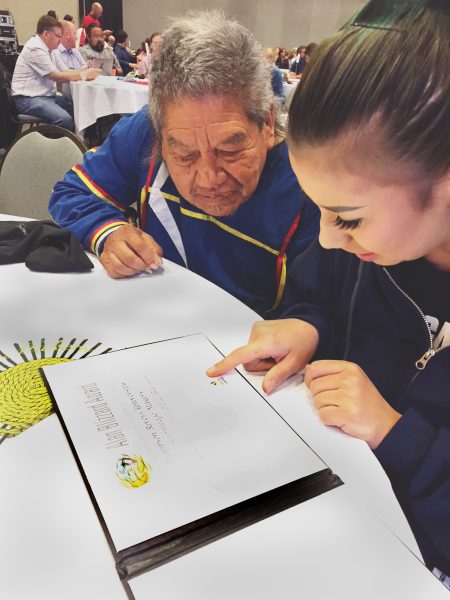Thompson Rivers University has won two of three prestigious national teaching awards from the Society for Teaching and Learning in Higher Education (STHLE).
On Wednesday, TRU was recognized with the Alan Blizzard Award at STHLE’s annual conference being held in Winnipeg.
The award recognizes collaboration in teaching. TRU won for Knowledge Makers, an initiative that involves more than 40 TRU faculty, staff, deans and students working together to mentor Indigenous students in learning to conduct and publish research as Indigenous researchers.
The win builds on last year’s D2L (Desire2Learn) Innovation Award in Teaching and Learning that went to five educators across Canada, including TRU botanist Lyn Baldwin. That award is also administered by STHLE and was a first win for TRU.
Dr. Catharine Dishke Hondzel, director of TRU’s Centre for Excellence in Learning and Teaching (CELT), said both awards have a strong impact on students’ learning. STHLE is a national organization that sponsors national awards for excellence in teaching, leadership, collaboration and achievement.
“Teaching rarely happens in a vacuum,” she said.
Teaching on a different level
Presented every second year, the Alan Blizzard award is overseen by a selection committee. This year, the award attracted the most nominations ever.
“We are doing something phenomenal here,” she said of winning the two awards back to back. “This is something we should really be proud of.”
The Alan Blizzard award is named after STHLE’s president from 1987 to 1995. Blizzard was a firm believer in collaboration in education and teaching; he felt that team teaching was effective for student learning. The award is given to groups of two or more people who have demonstrated effective collaboration in post-secondary education.
The Knowledge Makers included several Indigenous Elders, all nine TRU faculties, CELT, TRU World, the Library, Research and Graduate Studies, the TRU Office of Indigenous Education and Open Learning.
Faculty of Education and Social Work Dean Airini said TRU’s size and the enthusiasm for teaching, commitment to Indigenous-led research and to working together for Indigenous advancement were behind the Knowledge Makers getting started in 2015/16.
“This is one of the beauties of working in a university this size,” she said. “We can step across lines to do needed work together.”

Elder Mike Arnouse and Tess Gagnon admire the Alan Blizzard Award presented to TRU’s Knowledge Makers initiative
Addressing a gap
At that time, Associate Vice-President of Research and Graduate Studies Will Garrett-Petts noticed Indigenous students were underserved as recipients of internal research grants promoting TRU’s strength in undergraduate researcher opportunities. Dr. Sereana Naepi and Airini developed Knowledge Makers to address that gap.
The Knowledge Makers came from that initial collaboration and grew into much more. It’s now a four-month mentorship program with undergraduate, graduate, doctorate and international circles. It is part of the core role of TRU Elders (Mike Arnouse, Doreen Kenoras, Dr. Margaret Vickers Hyslop and Estella Patrick Moller) and involves collaboration university wide.
“Our TRU Elders remind us that Knowledge Makers is about the students first and their strengths as Indigenous researchers. We see potential and our job is to help make that potential fulfilled,” Airini said. “We do have a bit of magic here.”
Airini said teaching and learning are interchangeable in Knowledge Makers. Academics are also learning from the students. This dynamic approach is key in indigenized teaching and learning practices in the Knowledge Makers. Everyone is working together to expand the research needed in service to others.
“Research is a form of service. By recognizing the team of teachers through this award, this really shines the light on the Knowledge Maker students,” Airini said. “And that together we’re expanding Indigenous-led research.”
Indigenous researchers are flourishing
Since 2015 Indigenous students from more than 30 bands and nations have completed this interdisciplinary researcher mentoring program. To date, 64 Knowledge Makers have published their first reviewed journal article. These articles are now being cited in further research.
Knowledge Makers alumni have gone on to graduate studies, scholarships, national research grants ($50,000), research assistantships and international conference presentations. The Knowledge Makers international circle makes it possible for TRU Indigenous students to meet with other Indigenous student researchers through a five-nation international mobility network Canada involving United States, Mexico, New Zealand and Australia.
“It’s a very special feeling to be part of Knowledge Makers. . . . This says universities are transforming. We are going to see more Indigenous researchers as academics—leading research and training future researchers. Knowledge Makers are high performers.”
Dishke Hondzel said Knowledge Makers breaks the mindset that students are good at some subjects and bad at others. Instead, a team is asking students what they need for support, and that mentoring is then provided.
“Students don’t always know how to amplify their voices. This gives them a microphone,” she said. “Everyone who is recognized in this award is a teacher who cares.”
The Knowledge Makers stood out because of its scope, which included Elders as teachers, Dishke Hondzel said.
“Universities don’t always put their Elders first. . . . It represents a community approach to teaching. With scope and breadth, you get depth.”
Knowledge Makers is breaking down barriers. TRU’s roots date back to 1970 when Cariboo College was created and spent its first year in buildings at the Kamloops Residential School. Just as the university evolved out of that past, so has the Knowledge Makers.
“This is part of the effort to decolonize the university as well.”
There is another teaching award that STHLE offers, the 3M National Teaching Fellowship, and Dishke Hondzel believes TRU can complete the trifecta.
“I’m determined. There are a lot of faculty here who could be recognized,” she said. “We have outstanding scholars here.”

